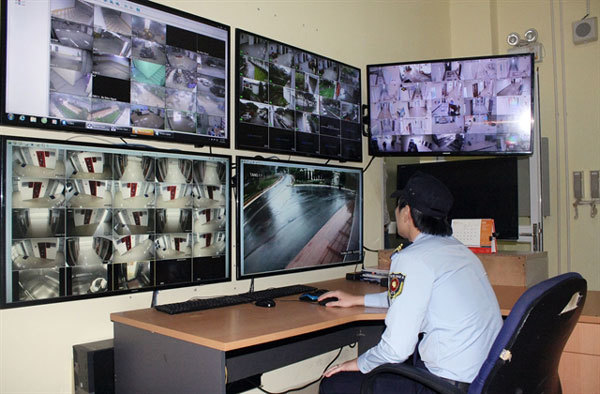Vietnam puts priority on artificial intelligence development
2019/09/04
In the development of the fourth industrial revolution, artificial intelligence (AI) has made significant progress and is expected to make breakthroughs in the next ten years.
Following the global trend, the Vietnamese Government aims to turn AI into a driving force of development and make it a top priority in growth policies.

AI is used at Quang Trung Software City in apartment building management.
One of the most important tasks is developing human resources, including improving higher education training quality, building 4.0 technology training institutes, encouraging technological application, renovation at businesses; and investment in science-technology research.
According to Minister of Science and Technology Chu Ngoc Anh Viet Nam has advantages in start-up innovation and technological development, especially in AI. With an open business climate and labour force interested in technology, the application of AI in various sectors has made progress, connecting parts of the nation’s AI ecosystem.
In Vietnam, AI has been applied in a number of sectors including healthcare, education, agriculture, transport and e-commerce.
The information-telecommunication-technology group FPT Corporation has applied AI in smart traffic in HCM City.
Viettel Military Industry and Telecoms Group is the first business in Vietnam to apply AI in endoscopy, helping identify, localise and assess levels of damage in the digestive system.
“AI reduces diagnosis time by five times compared to traditional methods with accuracy of up to 90 per cent,” Nguyen Quang Vinh from Viettel Business Solutions Corporation said.
In the agricultural and forestry sector, Viettel has applied AI in forest status and area statistics with accuracy of 80 per cent. The firm is looking to set up forest databases and management maps.
Viettel has also come up with a solution to help businesses fight cyberattacks and tighten internal security.
According to Deputy Prime Minister Vu Duc Dam AI aims to make society safe and civilised. Projects like smart cities, travelling assistance, security control and information security are all to serve the country.
“AI offers opportunities for Vietnam to make breakthroughs and push the country forward,” he said.
AI ecosystem
Minister of Planning and Investment Nguyen Chi Dung said the ministry had set up a digital ecosystem for innovation and start-ups. The ministry had proposed to the Prime Minister a national innovation centre which supports technological breakthroughs and creative ideas of Vietnamese entrepreneurs.
The Ministry of Planning and Investment and Ministry of Science and Technology would accompany the AI community to help them address challenges in the process of studying and developing AI in Vietnam.
The Ministry of Planning and Investment had created favourable conditions to attract domestic and international investment in AI. At the Vietnam Venture Summit in June this year, 18 local and foreign investment funds committed investment of US$425 million for Vietnamese start-ups in the next three years.
Putting human resource development at the core of the AI industry, the Vietnamese innovation network had attracted technological experts.
The Ministry of Planning and Investment planned to expand the network of Vietnamese AI experts in other countries and establish a global fund to train high-quality human resources for the industry.
According to Ta Hai Tung, head of Information Technology Institute of Ha Noi University of Science and Technology the Vietnamese AI community is young and has potential to grow quickly.
Three years ago, overseas Vietnamese who were experts in the technology sector started to come back to Vietnam to develop AI and help the local community interact more with international counterparts.
The Vietnamese AI community so far involves foreign investors, associations, connecting specialists with State agencies and the market.
An alliance of AI communities in Vietnam debuted last month, including the Digital Transformation community, Machine Learning community, Google Developer community and Business Intelligence community.
International experience
Kyoo Sung Noh, chairman and CEO of Korea Productivity Centre, said like the Republic of Korea (RoK), AI would be the future of Vietnam. In the RoK, AI had changed the social structure, jobs, sectors and people. The Government’s policies to develop AI focused on human resources to serve national industry.
The RoK had studied and set up the infrastructure for big data. AI had also had impacts on recruitment and labourers’ quality classification, he said.
The level of AI application in Vietnam was high compared to the rest of Southeast Asia, as high as Singapore, he said, adding that Vietnam needed to have a long-term development
strategy.
According to Noh, in the RoK, AI is presented in products of large corporations. The Government has offered policy support for AI application to attract talents.
Vietnam and the Rok have room to co-operate in the sector as the two countries share commonalities. Vietnam has made efforts to build smart cities. The RoK built smart cities since 2000. About 40 per cent of Vietnamese people work in the agricultural sector. In spite of not having a large number of agricultural workers like Vietnam, the RoK has applied AI in agriculture. These similarities enable the RoK to share experience with Vietnam.
Le Hong Viet, director of technology at FPT Corporation, said human resources was a challenge for the corporation as the market faces a shortage of AI-trained labour. The outstanding AI experts who study overseas did not return.
Bui Hai Hung, founding director of VinAI, the first AI research lab in Vietnam funded by VinGroup, said higher education training was the core solution to address the AI human resource shortage. "VinAI targets to support universities in research and help lecturers gain interest in doing research."
Ta Hai Tung, from the Information Technology Institute of Ha Noi University of Science and Technology, said this year, the university opened an AI major with an admission score of 27 out of 30 with limited admitted students.
Data science and AI are among four research priorities of the university. The university will step up studies and training at graduate and post-graduate levels and strengthen co-operation between schools and enterprises.
